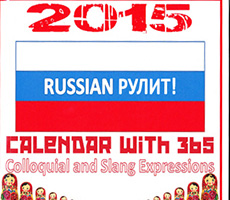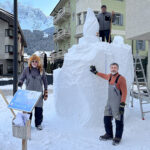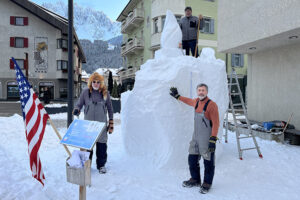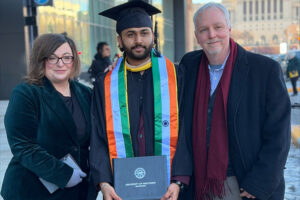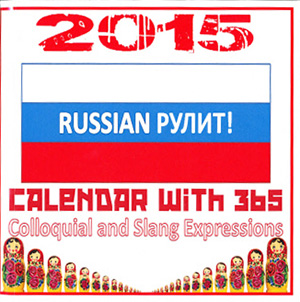 A Russian who wants to tell someone not to try to pull the wool over his eyes uses the Russian phrase: “Don’t hang noodles on my ears.”
A Russian who wants to tell someone not to try to pull the wool over his eyes uses the Russian phrase: “Don’t hang noodles on my ears.”
That entry for Jan. 16, 2015, is just one of 365 days’ worth of Russian slang and colloquial expressions that UW-Milwaukee Russian students have collected and now published in a calendar.
The 2015 calendar, “Russian Rulit” or “Russian Rocks,” was created during the 2014 spring semester by students in Russian 311: Advanced Grammar and Conversation, and is available on CreateSpace or Amazon.com All proceeds from the sale of the calendar go to UWM’s Russian Club.
The class project grew out of instructor Nina Familiant’s interest in getting her students to learn the language through phrases that students in Russia might use.
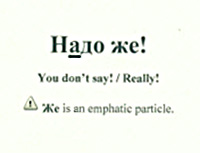
“If you want to know how Russians say ‘No kidding,’ ‘booze,’ ‘it sucks,’ or ‘bummer,’ this is the calendar for you,” she says.
The daily expressions are accompanied by a literal translation, an equivalent saying in English – if there is one – and a short grammar note.
The ten students in the class each brought three or four expressions into class for discussion as part of the collaborative project.
“The students did a tremendous job of consulting their Russian-speaking peers, books and online sources,” says Familiant. “Besides, I had a couple of heritage speakers who speak Russian at home and maintain the language, thanks to their parents. These students were also of great help.”
Student collaboration was vital. “It is still challenging for me to stay afloat with the colloquial language, especially, the language younger people of college age use,” adds Familiant, herself a native Russian speaker and teacher of the language.
Lively class discussions assured that the expressions chosen were not too old-fashioned, vulgar or inappropriate, while remaining true to the way college students speak. “Our in-class ‘censorship’ was pretty efficient and, as a result, it was practically impossible to let something vulgar slip into our project,” she says.
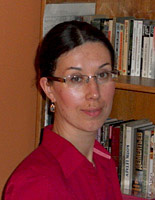
Of course, being college students, the class came up with plenty of Russian expressions for drinking, partying, romancing and stressing out before exams – each with a helpful grammar note. “Let’s go get some booze,” for example, includes a mini-lesson on Russian verbs of motion.
“My favorite would definitely have to be ‘Ya v shokoladye’ which translates as ‘I am in chocolate’ or ‘I am in the good/life is good,’” says student Brandon Roberts. “I would most likely end up using ‘Na zdorovie!’ because it is very uniquely Russian as it is used very frequently during toasts. It also has a good literal meaning – ‘to health!’”
Some expressions sound similar to their English equivalents. The translation for “лузер” is “loozer,” meaning “loser.” The Feb. 21 calendar entry helpfully notes that the plural is “лузеры,” or “loozery.”
Other Russian expressions need a bit more explanation and cultural context. “Всё, Бобик сдоx (vse, Bobik sdokh),” for example, literally means: “That’s it. Bobik died.” However, the notes explain that Bobik is a common name for a dog in Russia, and “sdokh” is a short informal, derogatory term for “to die.” The closest English equivalent, the class decided, was “dog tired.”
Familiant had learned about self-publishing and print-on-demand options in putting together a family history. In researching ideas for the class project, she came across CreateSpace, which is part of Amazon. Using the service was free, although professional consulting was available for a fee.
“I was looking for an easy, fun and immediate publishing option – no formal submission, no waiting time, no contract – the option that allowed the students to see the result of their semester-long work right away, before the class was even over,” she says.
One of the students, Artyom Grigoryan, designed the cover. Students Eileen Donovan and Kathy Quirk collaborated on the introductory letter. Two more helped with proofreading, and Russian program graduate Nicholas (Kolya) Sielicki did a final editing and proofing.
As a native Russian speaker who spent some time wrestling with the byways of the English language, Familiant knows that idioms and slang expressions are a challenge in learning any language.
“Idioms and colloquialism can be very tricky especially because they are often bound to certain social groups and could sound inappropriate if taken outside of their language environment,” she explains.
“Whatever sounds cool for college kids might sound vulgar for their parents. Idioms are the tip of the cultural iceberg, and require a lot of time to be explored and understood. This is harder and more challenging than just memorizing words and phrases.”
The students enjoyed the challenge.
Even with the grammar notes, they conclude: “Really, we hope you have as much fun reading it as we did making it. From Russian 311, Advanced Grammar and Conversation, with love. ”
Artline: Brandon Roberts, one of the student authors, with Nina Familiant and the calendar her Russian conversation class created. The full list of student contributors includes: Eileen Donovan, Brittany Blackburn, Artyom Grigoryan, Aaron Kuczmarcki, Sara Rantanen, Matthew Kalvin, Tigran Grigoryev, Maggie Iken and Kathy Quirk.*
*Truth in journalism. The author was a student auditing this class.
